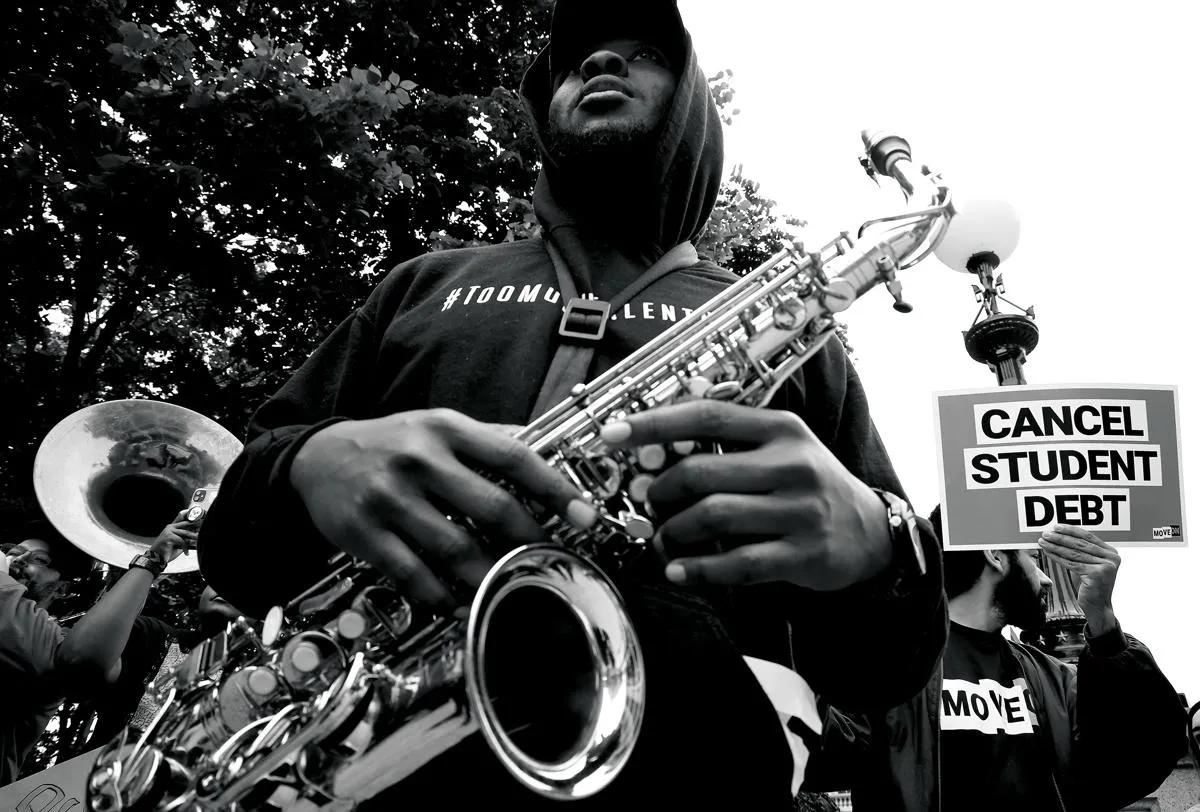My coming-out in the early 2000s was sheepish, a clean cut. Just do what it takes to get to college and start fresh as a gay man, I would think to myself a hundred times a day. Growing up in rural Illinois -- and not (knowingly) seeing or interacting with any gay people as a young person -- the allure of going far away from home for college was worth any sum of money to me at the time. This wasn't just about pursuing an education; it was about having space to discover my identity.
The sentiment is one echoed by many queer people, some of whom grew up in tumultuous family environments.
Student loans have long been a sore spot in young adult finances, but the last two decades have seen debt burdens spiral into crisis-level territory. Between 1995 and 2017, tuition at public four-year undergraduate schools increased by 120 percent, and tuition at nonprofit four-year schools rose by 76 percent (when adjusted for inflation), according to the College Board.
“I Expect to Die with Student Loan Debt”
Student loan borrowers in America collectively owe an eye-watering $1.75 trillion in federal and private student loans, according to the Federal Reserve Bank of St. Louis. Additionally, the average federal loan debt balance in 2022 is $37,014, notes a report from the Education Data Initiative.
"I expect to die with student loan debt," says Ring. "Honestly. That's how much [time] I hope I have for being able to pay off six figures' worth of loans."
Last year was the first time the U.S. Census's Household Pulse Survey included identification questions on sexual orientation and gender identity. The survey's findings were compelling and painted a clearer picture of what LGBTQ+ financial hardship actually looks like in America:
- Cost of living: 36.6 percent of LGBT adults struggled to pay for household expenses in the previous seven days, compared to 26.1 percent of non-LGBT adults.
- Income generation: 19.8 percent of LGBT households had lost employment income in the previous four weeks, compared to 16.8 percent of non-LGBT households.
- Food insecurity: 13.1 percent of LGBT households reported there was "sometimes" or "often" not enough to eat in the past seven days, compared to 7.2 percent of non-LGBT households.
COVID-19 made things worse. In the fall of 2020, 12.4 percent of LGBTQ+ adults were laid off from work, compared to 7.8 percent of non-LGBTQ+ adults, according to data from the Williams Institute at the University of California, Los Angeles. A likely factor for this is that 40 percent of queer people work in service-related industries, which were hit especially hard during the pandemic, compared to 22 percent of non-LGBTQ+ people. If things have felt tougher lately with regard to money, it's not just you: they are.
Queer people often have more to overcome financially, and student loans add to the burden. But as Ring notes, the prospect of finding your community and getting to be your authentic self creates a longing that is too irresistible to ignore.
"I was not allowed to have a girlfriend when I was living at home because of my mom's beliefs," they say. "Once I got out and was living in the dorms and had more independence, I was able to more freely be out. I was able to connect with other LGBTQ peers. I came out as nonbinary in my undergrad career as well; that wouldn't have happened if I had been living at home with my parents, because I wouldn't have had the opportunity for exploration."
Tips for Tackling Your Student Loans (And Everything Else)
If you're one of the millions of people dealing with student loans or other debts, here are a few suggestions for how to keep your head above water along the way.
Know Your Repayment Options
Research whether you're eligible for an income-based repayment plan, and if you are, crunch the numbers to ensure you'll actually be whittling away at the principal. Also look up if your industry participates in a Public Service Loan Forgiveness plan, which could create opportunities to have your loans partially or fully forgiven after a certain number of years.
Find Other Income Streams
Take it from me, a finance editor -- saving and investing aren't cute unless there's actually money in your bank account to play with in the first place. Side hustles and other forms of entrepreneurship are more popular than ever, and with the way things are currently going politically, our future LGBTQ+ work protections may be in peril; learn how to make money yourself and become your own boss to help close the gap.
Still Save for Emergencies
Paying down debt is sexy, but remember to also start building up your assets. Your half-paid student loan debt won't save your ass in times of crisis, but an emergency savings fund will; consider working on both financial goals concurrently.
Ring wishes they had pursued more of the obscure college scholarship applications during their time in school. Other than that, though, they wouldn't change a thing. "I think definitely, for me, taking out the loans was worth it in the end," they say. "I'm now a therapist, and I work with LGBTQ folks predominantly. And so I'm able to use my own life experience and use what I've learned, thanks to those student loans financing my education, to give back to the LGBTQ community, which is very fulfilling." ◆


